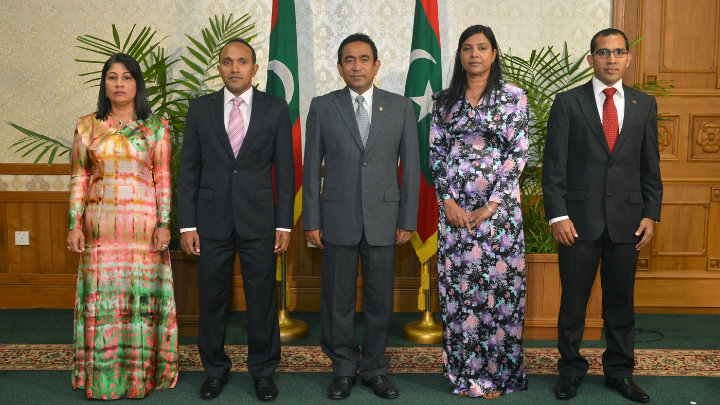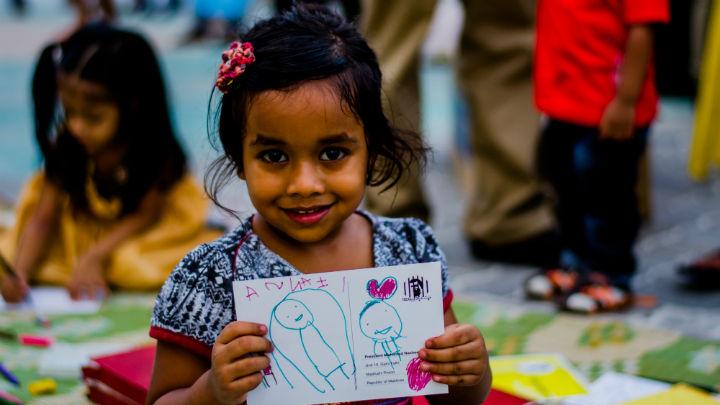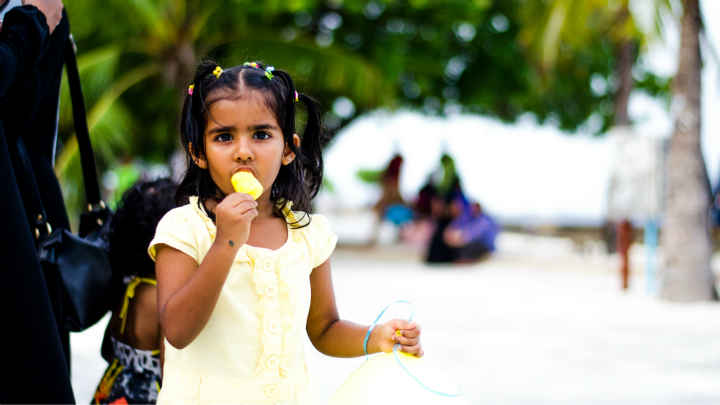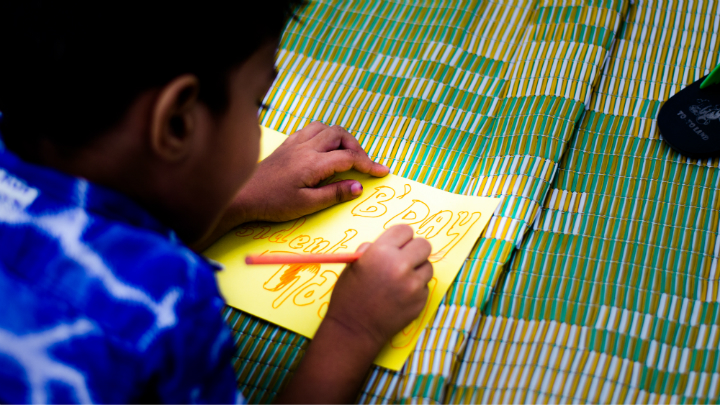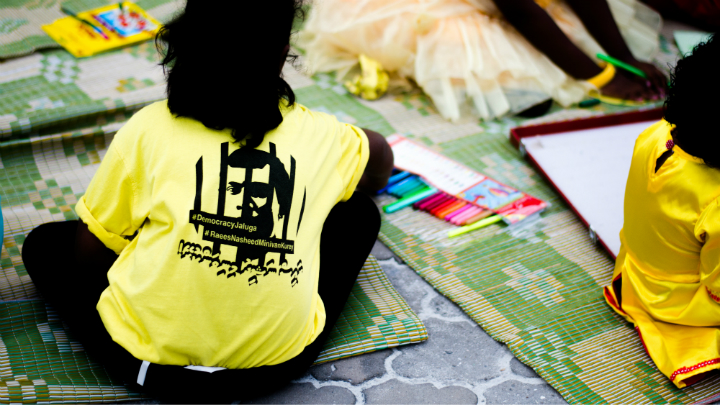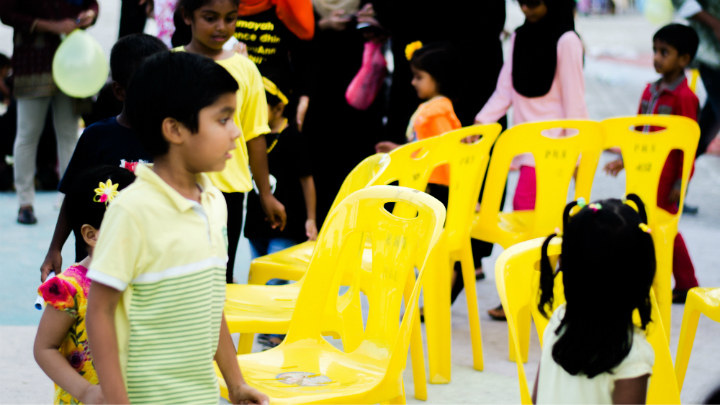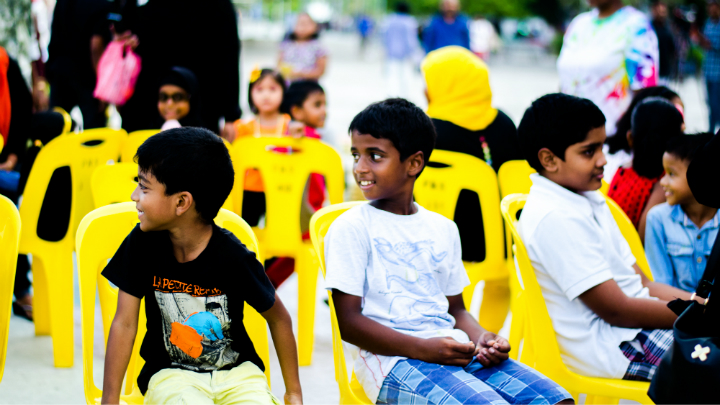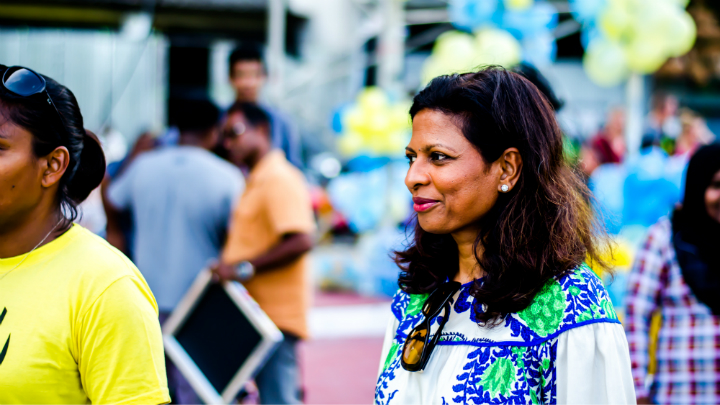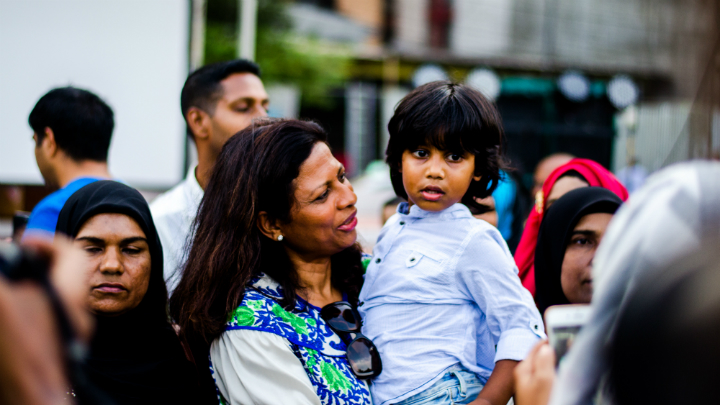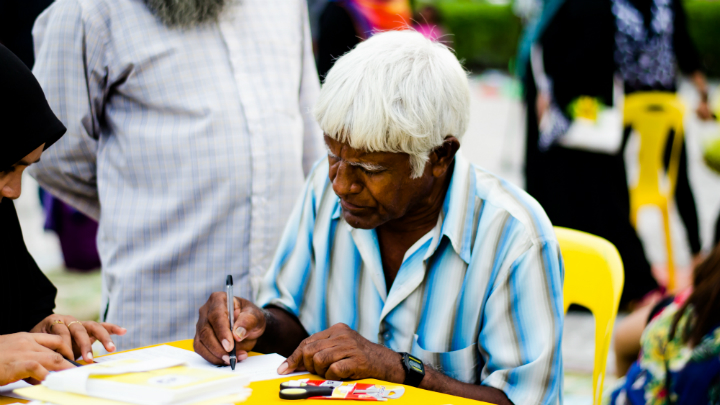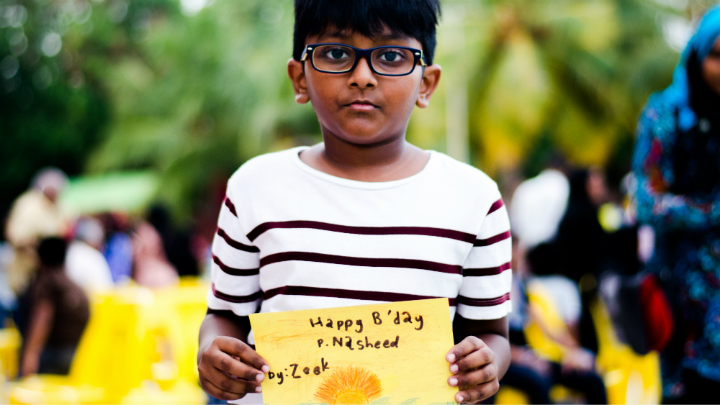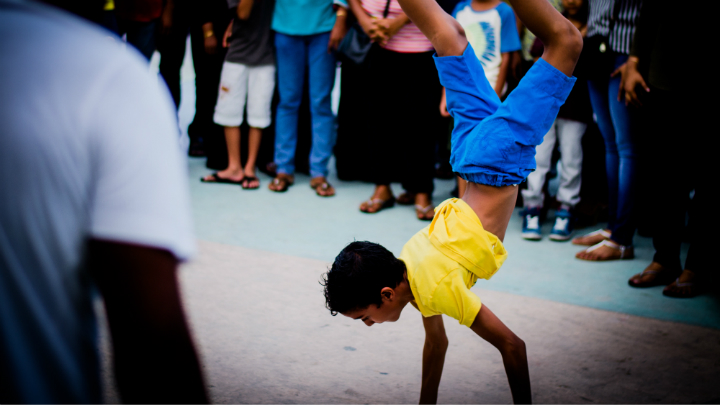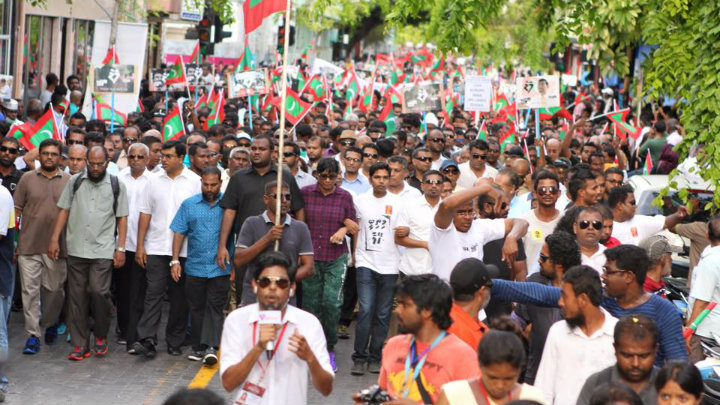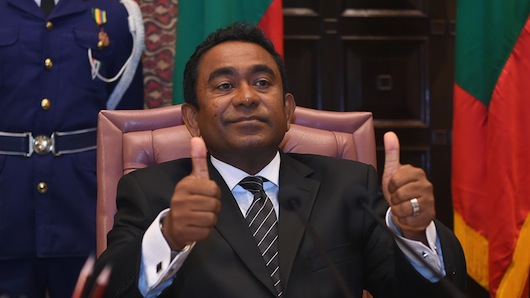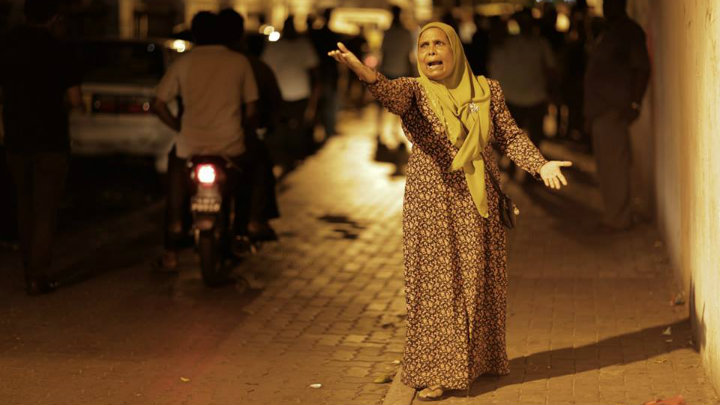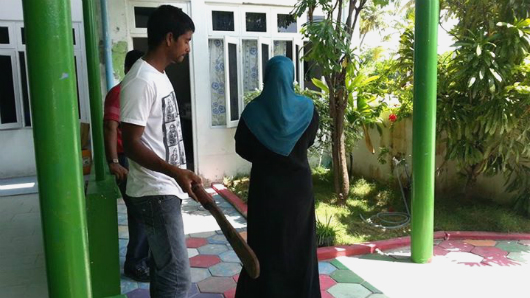On a rainy Sunday night, dozens of families gathered in Malé to meet with lawyers over the detention of their loved ones, arrested from a mass anti-government protest on May 1. The vast majority of the 193 detainees had never been arrested before.
Some families had travelled rough seas and weathered strong winds to come to Malé to find out the news. Lawyers passed on messages from those in custody—where keys had been left, progress on monthly rent, extent of injuries—and advised families on how they could seek redress for police brutality.
The May 1 arrests were the largest numbers detained from a single protest in a decade. Some 20,000 protesters took to the streets on May Day against authoritarianism, and called for the release of jailed ex-president Mohamed Nasheed. When protesters attempted to enter Malé’s main square at dusk, the police cracked down with tear gas, pepper spray, baton charges, stun grenades and indiscriminate arrests. Malé’s streets were empty by 1:00am, and three leaders of the allied parties were arrested.
The government declared ‘victory’ with a fireworks display and said that President Abdulla Yameen will not negotiate over Nasheed’s imprisonment.
With opposition leaders and scores of supporters still in jail, the opposition coalition’s activities have slowed. Police have prohibited gatherings beyond 12:00am, and dispersed any attempts at street protests by arresting key figures. Malé City is calm for now, but anger is simmering.
Opposition supporters remain determined to continue protests, with many saying the police brutality they witnessed on May Day only strengthened their resolve. Growing international pressure over Nasheed’s imprisonment and scrutiny of the judiciary is giving many further hopes.
Anger in Dhoonidhoo
Businessman Mujthaba ‘Muju’ Saeed, 40, was among the first 50 detainees released last Thursday. The protesters in Dhoonidhoo detention centre are angry, but remain strong, he said. “As soon as I was released, I went to the opposition rally. We are not afraid, we are angry.”
According to Muju, two ruling party supporters were also arrested; one was on his way to open a shop while the other was on his way to a safari boat where he works.
Conditions at Dhoonidhoo island detention centre are cramped, with 40 people packed into cells designed to hold just 20. Some are sleeping upright, or sleeping by the entrance to the bathrooms. Many are still nursing injuries from beatings and pepper spray. Several people who were recently released said detainees are calling for the resignation of president Yameen, police chief Hussein Waheed and tourism minister Ahmed Adeeb from their cells.
Some 116 people have now been released, and the police have asked the prosecutor general to press charges against 129. If prosecuted, many face a MVR3,000 fine or a six-month jail term. Charges range from disobedience to order to assaulting police officers.
Zahiya Abdulla, 47, and two of her sisters were also arrested from the protest. In the women’s cell, those arrested from the protest held yoga classes, and bonded with others held on charges of drug abuse and sexual offences. “No one was crying despite the physical and verbal abuse they suffered. I will always be on the front lines of the protests,” she said.
An even bigger rally
The opposition has vowed to continue protests, with Maldivian Democratic Party (MDP) MP Ibrahim ‘Ibu’ Mohamed Solih pledging to hold “an even bigger rally” by the end of the month.
“We have re-formed our ranks, and we’ve are out to go forward once again. Our resolve remains strong,” he told a thousand supporters at a rally this weekend.
At the rally, some voiced concerns over the how disorganised the May Day protest was, yet they described it as a success. A 23-year-old student marvelled at the sheer number of people at the rally: “People are aware now, they know what is going on.” A housewife said: “We came out by the thousands, we were unarmed, but they pushed us back because they had shields, batons, tear gas and pepper spray.”
Some were scared, but angry. A 62-year-old boat owner said he will march and protest as long as the police do not crack down.“But I do believe we will prevail. Our prayers are as powerful as any sword,” he said.
“We’ve been here before”
A 46-year-old, who had played a key role in organising the pro-democracy “August 12/13 protests” of 2004, told Minivan News he, too, was amazed by the numbers on May Day. He believes approximately 8,000 people had participated in the August12/13 protests a decade ago. “Now, we are seeing thousands more, women, young people, elderly, who’ve never participated in political rallies before,” he said.
The August 12/13 protests had forced then-President Maumoon Abdul Gayoom to bring in liberal reforms, a democratic constitution and hold multi-party elections in 2008.
“We’ve been here before,” MDP MP Eva Abdulla said. “The exact same situation—large numbers of people on the street, president Nasheed in jail, the same heavy-handed tactics by the government, defiance to the international community, jailing hundreds, including parliamentarians – until the point the government just couldn’t continue.”
For Eva, there is no choice for the opposition but to continue with protests. “Public opinion does not matter to this government. But we must show all observers, we, the Maldivian public are not OK with what is happening.”
The international spotlight is once again on Maldives. Calls for Nasheed’s release are growing, with several countries, including the US, UK and India slamming the Maldives’ politicised judiciary at a recent human rights council session. The EU parliament last month urged member states to warn tourists over Maldives’ human rights record, and Nasheed’s family has asked the UN’s working group on arbitrary detention to rule his imprisonment as illegal.
But the government maintains the international community cannot dictate what the Maldives must do, and the home minister Umar Naseer has vowed to keep Nasheed in jail.
Eva said President Abdulla Yameen will relent as international pressure grows: “We are absolutely and entirely dependent on international goodwill.”
Back at the meeting between lawyers and families of detainees, one woman said she will now join the opposition protests because of her resort worker husband’s arrest on May Day. She had gone by the criminal court to see if she could catch a glimpse of him at his remand hearing the next day, but instead, she was verbally abused, pepper sprayed and pushed back by police in riot gear. She said she saw police officers pepper-spraying a pregnant woman.
“I’ve never seen such brutality before. It is almost as if the police view us as their enemies. But we are the real power here,” she said.
Photo by Shaari
Likes (2)Dislikes
(2)Dislikes (0)
(0) 